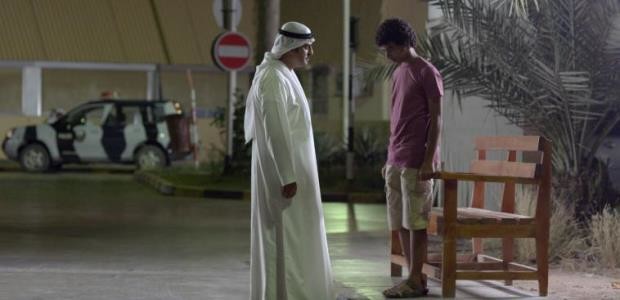In his first feature length film, Emirati director Walid Al Shehhi shows that his heart is in the right place with a film that looks to be ahead of its time. Using subtle and often poetic metaphors, Al Shehhi visualizes the social structure of the region through the moral dilemmas of its three main characters – Saud and his divorced parents Fadel and Kawthar.
Set in Ras Al Khaimah over a period of twenty-four hours, we follow Saud as he tries to get his parents back together. Saud stays with his mother Kawthar who is out most of the time. Having been married and divorced at a young age, Kawthar feels her youth was snatched away. As a single mother, she wants to start a new life and is seen texting potential suitors and visiting wedding boutiques. Saud does not approve of this but can’t find it in himself to confront his mother directly. When he approaches his estranged father to do something about it, he gets turned away. His father Fadel works as an ambulance driver and finds recourse in his work. There’s sadness in Fadel’s eyes but we aren’t sure if this is due to the nature of his work or due to his own personal demons, part of which includes ignoring calls from his son. Struggling with rejection, Saud and his friend Hilal head to the seaside where their juvenile banter leads them on an adventure to encounter dolphins.
Dolphins is high on social commentary and even dares to foretell of the changing social structure in the UAE. It’s a writing on the wall, especially since the cultural norms of the region have long withstood foreign contamination. While the message is clear, characterization leaves more to be desired. The actors playing Saud’s parents are so uninspiring that we aren’t given a chance to fully connect with them. Supporting characters like Hilal have nothing much to add to the story and I found myself getting annoyed, (as did Saud) as his only purpose was to ask silly questions. In oversight of the acting, I suspect the director was focused more on what the film says rather than how it is said. Scenes where Saud rides an unregistered (and probably unlicensed) quad bike are mirrored by real life images of youth with disregard for authority. Another scene showing Saud rebelling against his mother leads us to believe that respect for elders are on the decline. At the same time, when confronted by his father, Saud’s body language is a lot more submissive.
If perceived as an experimental film, Dolphins succeeds, and so does Al Shehhi and the message that he has to convey. My initial reactions weren’t as receptive but the fact that the film ends in ambiguity suggests the need for further thought. At best, this is a film that once you watch it, it grows on you over time.
Rating: 




